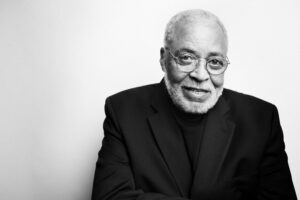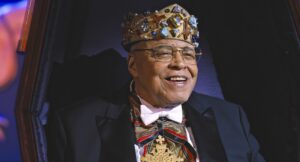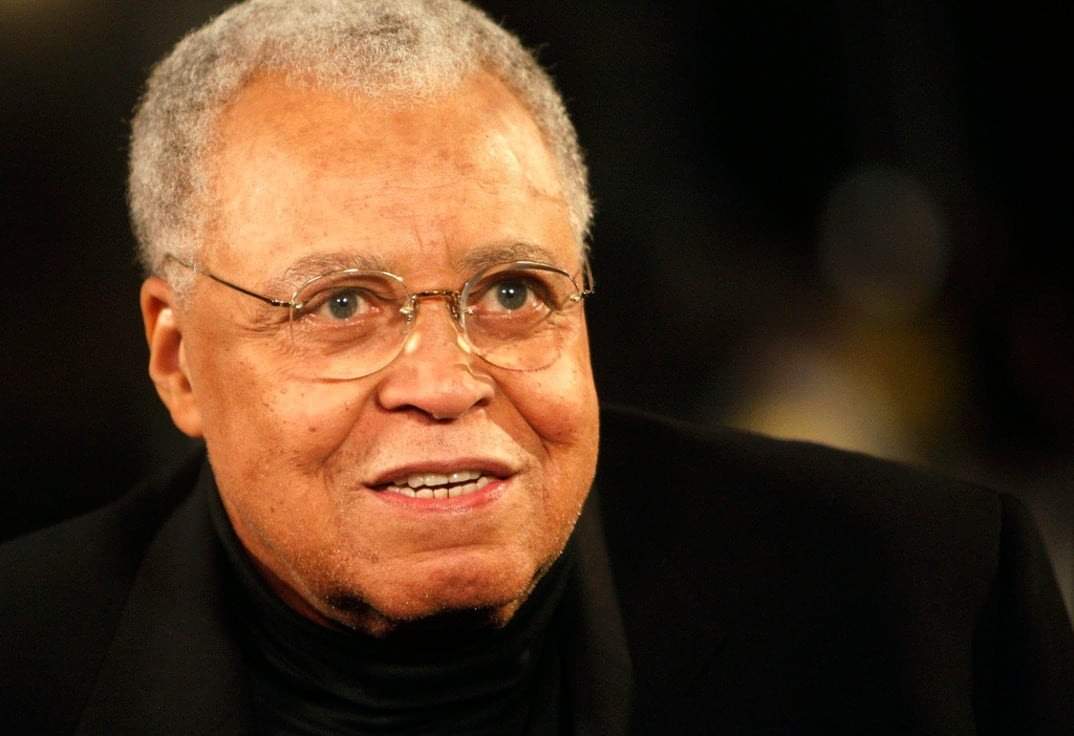On September 9, 2024, the entertainment world lost one of its most iconic figures. James Earl Jones, known for his deep, resonant voice and commanding presence on stage and screen, passed away at the age of 93. Throughout his seven-decade career, Jones became a monumental figure in Hollywood, carving a space for himself as both a revered character actor and a vocal powerhouse.

Jones, a contemporary of fellow legendary Black actors like Sidney Poitier and Harry Belafonte, stood apart with a career defined more by versatility than leading roles. Despite the limited opportunities for Black actors during his early years in Hollywood, Jones achieved a rare longevity in the industry, consistently delivering unforgettable performances. His work spanned from his 1964 film debut in Stanley Kubrick’s *Dr. Strangelove* to his 2021 reprisal of King Joffer in the sequel to *Coming to America*.
One of the most profound aspects of Jones’s life and career was his ability to overcome early adversity. Born on January 17, 1931, in Arkabutla, Mississippi, he was raised primarily by his maternal grandparents in Michigan after his father, actor Robert Earl Jones, left to pursue a career in theater. Jones struggled with a severe stutter as a child, which led him to avoid speaking. It wasn’t until a high school teacher encouraged him to recite poetry aloud that he found his voice—a voice that would soon become one of the most recognizable in the world.
After graduating from the University of Michigan in 1955 and serving in the U.S. Army for two years, Jones made his way to New York City to follow in his father’s footsteps. He worked as a janitor to support himself while studying acting at the American Theatre Wing. Jones’s dedication paid off when he made his Broadway debut in *Sunrise at Campobello* in 1958. However, his career truly took off in 1961 with his performance in Jean Genet’s play *The Blacks*, where he shared the stage with soon-to-be iconic actors like Cicely Tyson and Maya Angelou.
Jones’s portrayal of Othello in a 1964 Shakespeare in the Park production earned him widespread acclaim. The New York Times lauded his performance, noting his “full, resonant voice and a supple body” and describing his portrayal as having “emotional credibility.” That same voice became his trademark, captivating audiences in every medium he worked in.
However, his role as the fictionalized boxer Jack Johnson in *The Great White Hope* (1967) is often cited as a career-defining moment. Jones’s portrayal of Johnson, the first Black world heavyweight boxing champion, broke racial barriers on Broadway. His performance earned him the Tony Award for Best Actor, and when the play was adapted into a film in 1970, Jones received an Academy Award nomination. Although he lost to George C. Scott (*Patton*), the role cemented Jones as a powerhouse in American theater and cinema.

Despite his talents, the 1970s did not see Jones landing many leading film roles, though he continued to thrive on stage. One of his most recognizable on-screen roles during this period was in the television miniseries *Roots*, in which he portrayed author Alex Haley. Yet, it was his uncredited work that would go on to shape pop culture for generations: his voice work as Darth Vader in George Lucas’s *Star Wars* franchise. Jones’s iconic baritone brought life to the menacing Sith Lord, forever linking him with one of the most significant cinematic sagas of all time.
His contributions to Hollywood didn’t end there. In 1994, Jones’s voice once again became central to a cultural phenomenon when he voiced Mufasa in Disney’s *The Lion King*. The role would resonate with audiences worldwide, and Jones would return to voice Mufasa in the 2019 live-action remake of the film, making him the only original cast member to reprise his role.
Despite his numerous achievements, Jones remained humble, often downplaying his contributions. In an interview with *TODAY* in 2017, he described himself as a “journeyman” who “wandered into some interesting situations.” That humility extended to his work in *Star Wars*, where he initially asked to remain uncredited, feeling that Darth Vader actor David Prowse had done the heavy lifting.
Jones’s career is a testament to perseverance, talent, and adaptability. He won two Tony Awards, two Emmy Awards, a Grammy, and an honorary Academy Award. Yet, he was often underappreciated by the broader film industry, a fact that many in the entertainment world lamented over the years. He may have been denied the elusive EGOT (Emmy, Grammy, Oscar, and Tony), but his influence and contributions are undeniable.
Even in his later years, Jones continued to act and lend his voice to projects, becoming a mentor to younger generations of actors. His personal life, including his 1982 marriage to actress Cecilia Hart and the birth of their son Flynn, was marked by quiet devotion. Hart’s death in 2016 was a significant loss for Jones, but he continued to work and engage with the world around him.
James Earl Jones’s death marks the end of an era in American theater, film, and television. His voice, which once commanded audiences in Shakespeare’s *Othello* and as the voice of Darth Vader, may be silent, but his legacy as one of the greatest actors of the 20th and 21st centuries will endure for generations to come.
